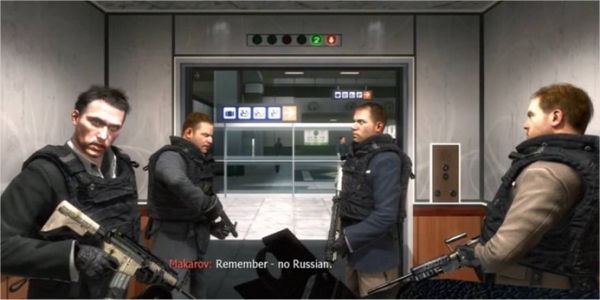Bad Video Game Behavior Results In Positive Social Behavior, Says Study

So you know how you take control of terrorists, bad guys, villains or “good guys” tasked with doing bad things (i.e., Call of Duty's “No Russian” stage)? Well, a new study has found that these villainous acts of evil can sometimes incite within players a feeling of guilt or a moral measure of compassion for the virtual victims to whom these acts were committed. In result, the study showed that players who commit vile in-game acts as a virtual character are more likely to commit positive civil acts in real life.
University of Buffalo recently printed a paper on a study conducted and led by Matthew Grizzard, PhD, assistant professor in the University at Buffalo Department of Communication, who worked with researchers from Michigan State University and the University of Texas, Austin, in regards to real life social behaviors in result of playing violent video games.
According to Grizzard...
“Rather than leading players to become less moral,” ... “this research suggests that violent video-game play may actually lead to increased moral sensitivity. This may, as it does in real life, provoke players to engage in voluntary behavior that benefits others.”
The study tested 185 different participants who were randomly assigned guilt-inducing conditions. According to the study, the “guilt inducing” situations caused some participants to become more compassionate after committing an act deemed “immoral”.
The behavior in the game supposedly elicited more pro-social behavior in those who partook in the study.
As noted by Grizzard...
“We suggest that pro-social behavior also may result when guilt is provoked by virtual behavior,” … “We found that after a subject played a violent video game, they felt guilt and that guilt was associated with greater sensitivity toward the two particular domains they violated — those of care/harm and fairness/reciprocity,”
It seems a little jarring that the study would come to that conclusion – a lot of times in games there's hardly any reprisal or repercussions for doing something “bad”. I mean, the police come after you in a game like GTA for continuously running people over or gunning them down, but your character isn't going to get caught, thrown in the back of a cruiser and carted off to prison where players will spend a good deal of the game trying to avoid prison fights and writing in a journal about the terrible atrocities they committed while free-roaming.
CINEMABLEND NEWSLETTER
Your Daily Blend of Entertainment News
There are other games that manufacture moments of “guilt”, such as Call of Duty, Mass Effect or the recent Battlefield games where “tough” decisions are made and characters are either killed or maimed in disturbing ways.
Nevertheless, the study apparently found a lot of empathic individuals or picked out some games that really pull at the heartstrings (TellTale's Walking Dead series perhaps?).
Grizzard goes on to say that...
“Our findings suggest that emotional experiences evoked by media exposure can increase the intuitive foundations upon which human beings make moral judgments,” … “This is particularly relevant for video-game play, where habitual engagement with that media is the norm for a small, but considerably important group of users.”
Grizzard goes on to break down how different portrayals of different characters in various situations can resonate with people in ways that may evoke a certain emotional response from the user. Unfortunately, the games used in the study weren't listed.
However, if you would like to learn more about the way the data was gathered and the correlation methods were accounted for, feel free to check out the original article over on the Buffalo University website.
Staff Writer at CinemaBlend.
After The Next Golden Bachelor Was Revealed, Joan Vassos Shared Some Cheeky Thoughts On Him
After I Heard Law And Order’s Hugh Dancy Quote SVU’s Iconic Opening, I Love His Take On 'Betrayal Of The Position’ After The Crossover
Olivia Wilde's Don't Worry Darling Follow-Up Is Apparently About 'Unexplored Sexuality', And The Cast Is A+ List










